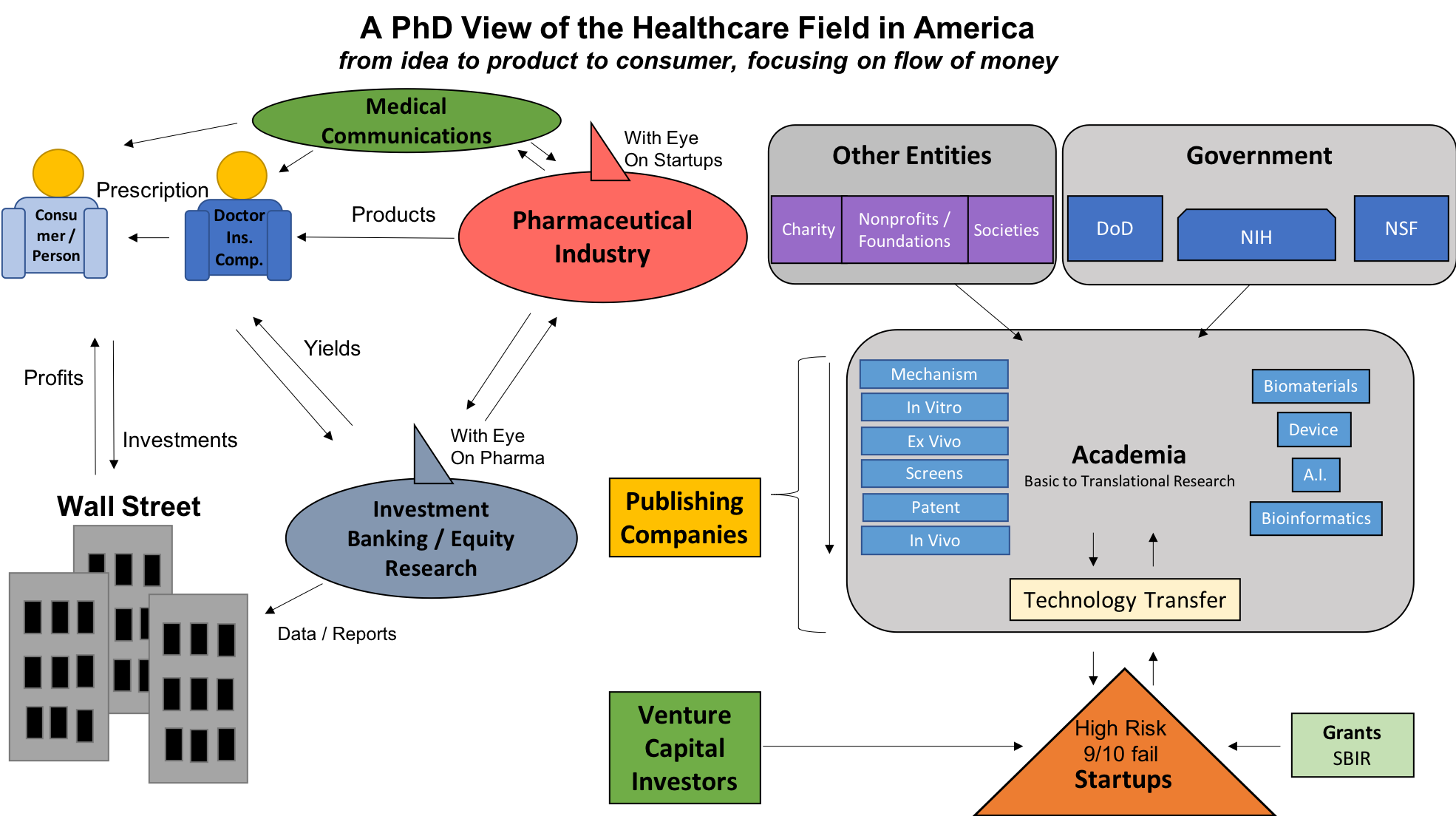Discovery to Development PhD Careers in Industry (Article 1)
BY: THOMAS R. COUGHLIN, PHD
This article highlights the movement of flow of scientific discovery through development leading to the consumer, with the different industries and careers along the way
In the lab and academic world, it’ hard to be aware of all the careers outside of academics. We’ve found out that there are large number of careers for PhDs that are science-related and trace back to discovery in the lab.
At PhD Source we encourage you to know how your academic experience fits into the greater field of PhDs. This helps you open yourself up to a realistic idea of where your PhD may lead to. We’ve discussed this in a previous article outlined here, “Self Diagnosing Your PhD or Postdoc – Assess for Success.”
The below graphic describes the flow of money, research and information that drives the the movement of scientific discovery through to development to the consumer.
Below: Highlighted below are the industries that function in the different areas of this discovery and development process. These are BOLD AND CAPITALIZED.
As we know, funding drives research in academia and research in academics is published in journals. Then, if a research project from a lab is at a point where it can be commercialized, the PI or lab members pursue this with the help of the COMMERCIALIZATION or TECHNOLOGY TRANSFER at their respective institution. Through this department, the university will conduct market research to identify the market need, help prepare the team for company declaration (LLC or corporation), aid in Venture Capital rounds, and then help the team adhere to regulatory standards to not run into problems later on if the device, product, or drug is successful.
In this process the team creates a startup and the seeking seed funding and applying for grants specific to points of the testing process (ie: clinical trials). VENTURE CAPITAL investors listen to pitches from these companies looking to see if they have what it takes to succeed. They analyze the team, the plan (to see if it’s realistic), the funding plan, the marketability, and how they will address potential points of failure.
PHARMACEUTICAL COMPANIES
PHARMACEUTICAL COMPANIES, specifically the big pharmaceutical companies, have multiple departments including: Production, Quality Control, Quality Assurance, Regulatory Affairs, Medical Affairs, R&D, Administration, Human Resources, Marketing and Sales, Business Development, Supply Chain, and Engineering. The big pharmaceutical companies are moving in the direction of not supporting as much new drug development for the stages of compound identification and preclinical models. Although, these companies still have them, it is more advantageous and lower risk to buy a company that shows promise. This de-risks the purchase of the drug and buying a company that shows a drug in a later stage of development increases the likelihood of that drug making it to market.
PhDs in pharmaceutical companies work in R&D, Medical Affairs, Engineering, Business Development, and Regulatory Affairs of pharmaceutical companies. .
R&D within a pharmaceutical company works on new discoveries and clinical trials are housed within Clinical Affairs department.
Medical Affairs within a pharmaceutical company includes branches that work on dissemination of information in the form of conferences representation, scientific publications, training of new products, and commercial and educational medical communications (both globally and nationally).
Business Development department aims to identify companies with strong pipelines of innovation and new products.
Clinical Affairs includes work on clinical trial execution, patient recruitment, and clinical office coordination.
Engineering PhDs work in production and oversee optimization of supply chain and development.
Regulatory Affairs works on adhering to FDA guidelines to comply with regulations in the drug approval process.
MEDICAL COMMUNICATIONS
MEDICAL COMMUNICATIONS companies are specialized companies that work with pharmaceutical and biotechnology companies to create all medical communication information to disseminate to patients, doctors, scientists, and the general public. These agencies maintain multiple clients, typically for 5 years, and develop strategies for branding the drug or product, disseminating updates, and creating content for different audiences.
INVESTMENT
BANKING FIRMS
INVESTMENT BANKING FIRMS hire PhDs to analyze healthcare trends by determining companies that have strong pipelines of research and development. They analyze companies that are advancing into new markets and report to their Senior analyst whether they should buy or sell, depending on the side of the business they are in.
SUMMARY
Everything is interconnected –Although some bench work may never see the light of day in the pharmaceutical world, the ideal goal is always to impact the patient. So there you have it, all the business players the are involved.
In the NEXT articles, we’ll go into the roles PhDs play in all of these divisions.
Thank you! Please fill out our Coaching Form and we’ll get back to you for personalized 1:1 coaching at any point of your career search.
Need a guide for exploring career options? Take a look at our previous article, “Dating Your Career.”
Unsure if you should consider Careers outside academics? Take a look at “Self Diagnosing Your PhD or Postdoc – Assess for Success.”
MORE COMING SOON!!! Please comment with ideas or other careers!
—




